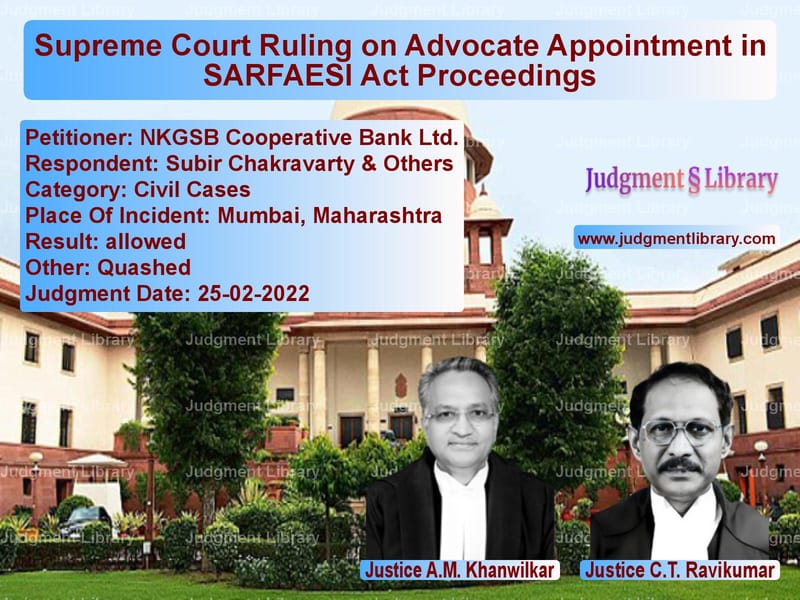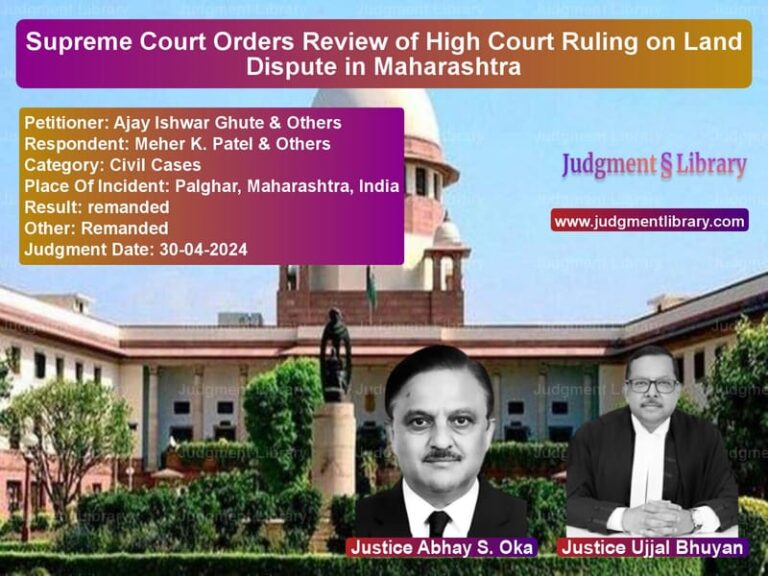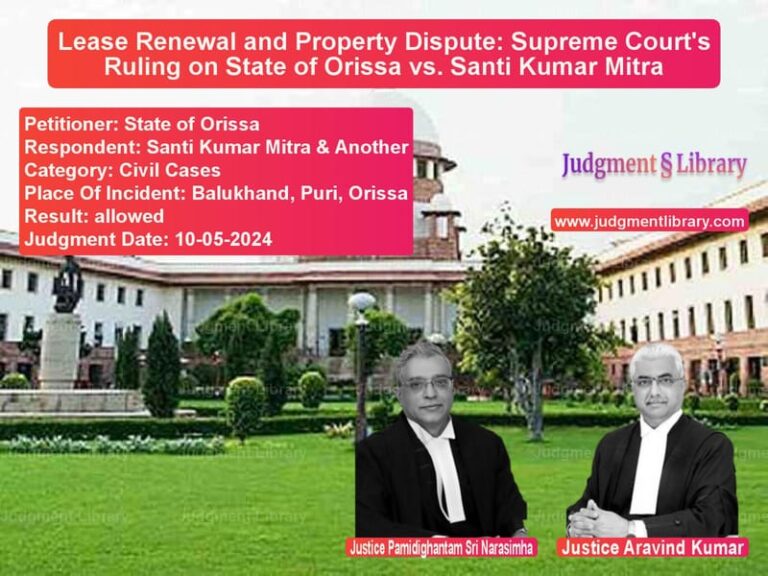Supreme Court Ruling on Advocate Appointment in SARFAESI Act Proceedings
The case of NKGSB Cooperative Bank Ltd. vs. Subir Chakravarty & Others involves a critical interpretation of the Securitisation and Reconstruction of Financial Assets and Enforcement of Security Interest Act, 2002 (SARFAESI Act). The primary issue before the Supreme Court was whether the Chief Metropolitan Magistrate (CMM) or the District Magistrate (DM) could appoint an advocate to take possession of secured assets under Section 14(1A) of the SARFAESI Act.
The judgment has significant implications for financial institutions, borrowers, and judicial officers involved in the enforcement of security interests.
Background of the Case
The dispute arose when financial institutions, including NKGSB Cooperative Bank Ltd., sought to take possession of secured assets from defaulting borrowers under the SARFAESI Act. The CMM/DM appointed advocates as commissioners to take possession of these assets and forward them to the secured creditor. However, conflicting judgments from various High Courts led to legal uncertainty.
The Bombay High Court ruled that appointing an advocate for this purpose was not permitted under Section 14(1A) of the SARFAESI Act, stating that only an officer subordinate to the CMM/DM could be authorized. In contrast, the Madras, Kerala, and Delhi High Courts upheld the validity of such appointments, arguing that advocates, as officers of the court, could fulfill this role.
Key Legal Issues
- Does Section 14(1A) of the SARFAESI Act allow the CMM/DM to appoint an advocate to take possession of secured assets?
- Are advocates considered “officers subordinate” to the CMM/DM for the purpose of executing such orders?
- What is the impact of conflicting High Court rulings on this issue?
Arguments Before the Supreme Court
Appellant’s Arguments (Financial Institutions)
The financial institutions, including NKGSB Cooperative Bank Ltd., contended:
- The appointment of advocates as commissioners was necessary due to the heavy workload of CMMs and DMs, making it impractical for them to personally take possession of secured assets.
- Advocates are officers of the court and can be considered functionally subordinate to the CMM/DM, allowing them to execute ministerial functions such as taking possession of assets.
- The practice of appointing advocates for such tasks had been followed for years without legal challenges until the Bombay High Court’s ruling.
- The Kerala, Madras, and Delhi High Courts had upheld this practice, demonstrating judicial consensus in favor of advocate appointments.
Respondent’s Arguments (Borrowers)
The borrowers argued:
- Section 14(1A) explicitly states that the CMM/DM may authorize an “officer subordinate” to take possession of assets, which does not include advocates.
- Allowing advocates to perform this function could lead to abuse of power and procedural irregularities.
- The decision of the Bombay High Court was correct in interpreting the law strictly and ensuring that only designated officers of the government performed this role.
- The borrowers’ rights were at risk if advocates, who are not government officers, were allowed to exercise such powers.
Supreme Court’s Judgment
The Supreme Court ruled in favor of the financial institutions, overturning the Bombay High Court’s decision and upholding the validity of appointing advocates as commissioners under Section 14(1A) of the SARFAESI Act.
The key findings were:
- The phrase “any officer subordinate to him” in Section 14(1A) should be interpreted broadly to include advocates as officers of the court.
- Advocates appointed by the CMM/DM function as extensions of the court, carrying out ministerial tasks necessary for the enforcement of security interests.
- The legislative intent of the SARFAESI Act is to facilitate the swift recovery of secured assets, and the appointment of advocates aids in this process.
- The judgments of the Kerala, Madras, and Delhi High Courts were affirmed, establishing a uniform legal position across India.
The Supreme Court observed:
“The secured creditors would be at a disadvantage if courts adopt an unduly restrictive interpretation of Section 14(1A). The appointment of advocates as commissioners is a longstanding and practical mechanism for ensuring compliance with the SARFAESI Act.”
Key Observations from the Judgment
- Interpretation of “officer subordinate”: The Court held that advocates, being officers of the court, could be deemed functionally subordinate to the CMM/DM for the limited purpose of executing orders under Section 14(1A).
- Practical Considerations: The Court recognized the heavy caseload of judicial officers and the need for efficient mechanisms to enforce security interests.
- Consistency Across Jurisdictions: The ruling resolves the conflict among High Courts, ensuring uniformity in the implementation of the SARFAESI Act.
- Role of Advocates: The judgment reinforces the role of advocates in the legal system, emphasizing their responsibility as officers of the court.
Impact of the Judgment
This ruling has far-reaching implications for financial institutions, borrowers, and judicial officers:
- For Financial Institutions: Provides legal clarity and facilitates the expeditious enforcement of security interests.
- For Borrowers: Establishes clear procedures for possession proceedings, reducing legal ambiguities.
- For Judicial Officers: Relieves CMMs and DMs of the burden of personally executing possession orders, allowing them to focus on adjudicatory functions.
- For Advocates: Reinforces their role in judicial proceedings and expands their responsibilities in the enforcement of security interests.
Conclusion
The Supreme Court’s decision in NKGSB Cooperative Bank Ltd. vs. Subir Chakravarty & Others settles a contentious legal issue by affirming that CMMs and DMs can appoint advocates to take possession of secured assets under the SARFAESI Act. By aligning with the rulings of the Kerala, Madras, and Delhi High Courts, the judgment ensures consistency in legal interpretation and enhances the efficiency of security enforcement proceedings.
This ruling is a significant milestone in banking and property law, reinforcing the importance of a streamlined legal framework for the recovery of secured assets.
Petitioner Name: NKGSB Cooperative Bank Ltd..Respondent Name: Subir Chakravarty & Others.Judgment By: Justice A.M. Khanwilkar, Justice C.T. Ravikumar.Place Of Incident: Mumbai, Maharashtra.Judgment Date: 25-02-2022.
Don’t miss out on the full details! Download the complete judgment in PDF format below and gain valuable insights instantly!
Download Judgment: nkgsb-cooperative-ba-vs-subir-chakravarty-&-supreme-court-of-india-judgment-dated-25-02-2022.pdf
Directly Download Judgment: Directly download this Judgment
See all petitions in Property Disputes
See all petitions in Debt Recovery
See all petitions in Judgment by A M Khanwilkar
See all petitions in Judgment by C.T. Ravikumar
See all petitions in allowed
See all petitions in Quashed
See all petitions in supreme court of India judgments February 2022
See all petitions in 2022 judgments
See all posts in Civil Cases Category
See all allowed petitions in Civil Cases Category
See all Dismissed petitions in Civil Cases Category
See all partially allowed petitions in Civil Cases Category







